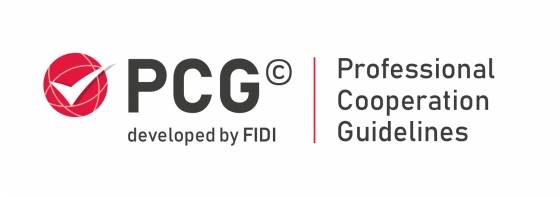FIDI Professional Cooperation Guidelines (The PCGs)
The FIDI Professional Cooperation Guidelines (The PCGs) are a set of industry guidelines covering all aspects of an international move. While FAIM focuses on stringent quality requirements mandatory for all FIDI affiliated companies, the PCGs provide a set of guidelines and best practices to facilitate high quality and unified cooperation between international moving companies and their partners.
The PCGs were created by a team of industry experts drawn from all geographical regions and various company sizes and types. The continued relevance of the PCGs is guaranteed through an annual review process. Complimentary to the FAIM Quality Standard, the PCGs provide answers to specific industry grey areas through a unified set of guidelines, leading to a common understanding within the industry.
- The PCGs were adopted by the International Assocation of Movers (IAM) in June 2018, by the Latin American and Caribbean International Movers Association (LACMA) in November 2019 and by the Pan-American International Movers Association (PAIMA) in October 2020. As such, the PCGs are increasingly being adopted as a norm for best practices throughout the international moving and relocation industry.
- If you're a company affiliated with the IAM, LACMA or PAIMA, please contact them directly to obtain a copy of the PCGs. FIDI Affiliates, you may download the FIDI PCGs by logging in to FIDINET and then consult My Business Tools.
Do note that not all companies displaying the PCGs logo are FIDI Affiliates or FAIM certified. The use of the logo ONLY indicates that they declare their commitment to the PCGs.
The PCGs cover the following topics:
1. Pre-Move Survey
The standard requirements in a pre-move survey, outlining the movers' expectations in terms of:
- Response to a request for a pre-move visit,
- Submission of the pre-move survey results and the related service quotation/rate to the Booker, and
- Acceptance of a pre-move survey result and quotation.
For example, the Origin Agent’s surveyor must have both English and local language skills, be capable of providing an accurate survey and able to counsel the customer on specific matters, including move allowances, restrictions and prohibited items which should not be included in an international move.
2. Origin services
The process and expectation between the movers, including:
- What is meant by standard origin service;
- What are the normal exclusions;
- What is the relevant protocol in case of a cargo overflow or freight transport service, a container no-show or not fit for purpose;
- What is the process when facing a shipment under allowance.
For example, the Origin Agent must provide experienced personnel resources (i.e., removal crew) for packing and handling of the move that is sufficient for completion of work within the agreed timetable.
3. Destination services
- What is expected from the Destination Agent when submitting the service rate, request or quotation.
- What are the standard destination service elements as well as the normal exclusions/limitations.
- Defined protocol when requested to take on board additional responsibilities (e.g. ‘Collect before delivery’).
- For example, identify import customs clearance formalities (if applicable) and clearly state if these are included in the offer or not.
4. Storage
- The roles and responsibilities of the Booker, Origin, Destination and Warehousing Agents when the goods go into storage.
- What movers should do in case of disagreement regarding storage charges (‘storage charges in arrears and lien’).
- For example, it is the Warehousing Agent’s responsibility to keep the goods safe in their warehouse which must be dry, secure, adequately equipped and professionally managed in accordance with the FAIM Quality Standard.
5. Mould, contamination, infestation
- The roles of each mover whenever facing a mould and/or mildew contamination, with the objective of further reducing the risks to the shipment/goods.
- Precautionary steps that the mover should take under such circumstances.
6. Accessorial services
- Supplemental or special service provided in addition to the standard contracted service.
7. Supply of removal staff (equipment) as help for (un)loading and (un)packing
- What is to be understood under these specific terms and the role of the movers involved.
- For example, the mover must provide uniformed and applicably experienced and/or licensed operative staff.
8. Invoicing and payment terms
- The expectations in terms of invoicing, payment terms and potential cancellation or postponement charges.
- The requirements in terms of communication and documentation.
9. Claims handling and settlement; loss or damage prevention and action
- The process of responding to a customer claim or complaint regarding damaged goods or property damages/public or contractual liability.
- Provision of loss or damage prevention actions at origin and destination.
Important: not all companies displaying the PCGs logo are FIDI Affiliates. The use of the logo ONLY indicates that they have declared their commitment to the PCGs.

